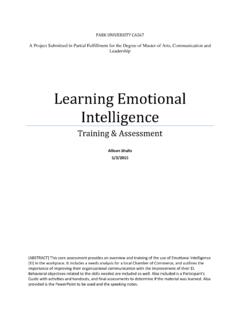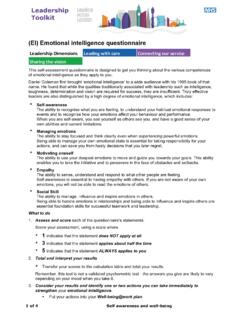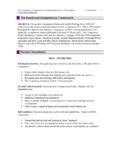Transcription of EMOTIONAL INTELLIGENCE: A GUIDE TO HOW IT WORKS
1 EMOTIONAL intelligence : A GUIDE TO HOW IT WORKS . Agenda Introduction/Overview Emotions, Moods, Feelings The Science behind EMOTIONAL intelligence Using EMOTIONAL intelligence Closing/Action Plan Learning Objectives After completing this training, you will be able to: Explain what EMOTIONAL intelligence is and is not Identify your own primary and secondary emotions Describe the connection between the brain and EMOTIONAL responses Use EMOTIONAL intelligence to change and control your emotions Apply EMOTIONAL intelligence to your own situations Did you ever know anyone who . Just didn't get it? Said the wrong thing? Did the wrong thing? Couldn't get along with anyone? Or everyone? Missed cues at meetings/parties? You just couldn't be around? Drove you crazy! EMOTIONAL intelligence What it is: What it is not: Understanding your own emotions Being smart Picking up on others' cues IQ. Managing your responses/reactions to others Controlling others' emotions Being appropriate in social situations Manipulating others Developing relationships Extroversion/Introversion Treating others well ANYONE CAN BECOME ANGRY - THAT IS EASY, BUT TO BE ANGRY WITH THE RIGHT PERSON AT.
2 THE RIGHT TIME, AND FOR THE RIGHT PURPOSE AND IN THE RIGHT WAY - THAT IS NOT WITHIN. EVERYONE'S POWER AND THAT IS NOT EASY . - ARISTOTLE, ANCIENT GREEK PHILOSOPHER. Emotions, Moods, Feelings What is an emotion? Why is it valuable to understand what you are feeling? Why is it important? How do feelings affect your mood? Our emotions and moods are contagious Primary and Secondary Emotions Primary emotions happen in the moment/real time; they Secondary emotions are complicated and built up; they move us to action. hinder us Joy Disapproval Happiness Disdain Fulfillment Hatred Contentment Coldness Peace Hostility Fear Persecution complex Shame Paranoia Sadness Distrust Hurt Worry Guilt Anxiety Frustration Insecurity Dissatisfaction Low self-esteem Disappointment Self-hatred Depression Anger/Rage Jealousy Next . We know how we feel . What does it mean? Keep a journal of your emotions and your behaviors . When I am angry, I yell When I am sad, I cry When I am hurt, I shut down When I am overwhelmed, I make mistakes Understanding Emotions Learn how to be the best listener Watch others' body language o What are they are really feeling?
3 O What emotion is their tone conveying? o Do their tones and their emotions match? Become more comfortable sharing your emotions Understanding the Brain Thalamus Relay center between our conscious and subconscious Helps us to react appropriately Cortex Thinking center Helps us make sense & sends messages Amygdala Regulates EMOTIONAL responses Here is our chance to change behavior HOW DOES EMOTIONAL intelligence REALLY WORK? Our Response to Triggers Traffic Awakened by a scary noise Yelling at work Worrying email/phone call Impending deadline Bad news TRIGGER. Activation of lower brain regions Irrational, kneejerk reaction , entirely EMOTIONAL Scream and Yell . Activation of higher brain regions Calm response, combination of emotion and logic Work to fix it . The Key Ingredient: Empathy Ask questions to understand how others are feeling How do your words/actions affect others? Anticipate how others are feeling Changing your Emotions How does a lucky rabbit foot make you feel? Has music ever changed your mood?
4 A picture of your family? The smell of coffee? Listening to a story about someone who did something amazing? Reprogram or rewire your brain: What WORKS for you? Controlling your Emotions Identify how you feel and then . Pause Walk away Take a deep breath Do a crossword puzzle, Sudoku, etc. Laugh Relax Paint, draw, cook The Benefits of EMOTIONAL intelligence at Work On the job, people with higher EMOTIONAL intelligence excel at: Staying calm under pressure Resolving conflict effectively Behaving with empathy Leading by example Those with high levels of EMOTIONAL intelligence delegate more effectively and more emphatically Increasing our EMOTIONAL intelligence makes us better employees, leaders, colleagues and teammates Emotionally Intelligent People are . Empathetic care how others feel Willing to change and open to it Positive people, that others want to be around Focused on achieving goals while motivating others More productive Activity Think about an interaction or situation at home or at work that caused an EMOTIONAL response in you, that didn't go well.
5 Who was involved? What triggered your response? What was the outcome? Based on what you learned today, what could you have done differently? Most Important Point Reflect back on the information presented today. What is the most important thing you learned? What is one thing you will do to become more Emotionally Intelligent? 21. EAP Servic es available t o employees, any household members and dependent s Your Conf ident ial EAP Counselors available 24/ 7/ 365 via 833-539-7285. Kepro Up t o 6 in person c ounseling sessions, per issue, per year Management Consult at ions EAPur Financ ial/ Legal Consult at ion and Ref erral Servic e Kepro EAP W ork/ Lif e & Convenienc e Servic es ht t ps:/ / eexpert .c om Company c ode: SOW I. Questions & Answer EMOTIONAL intelligence : A GUIDE to How it WORKS






